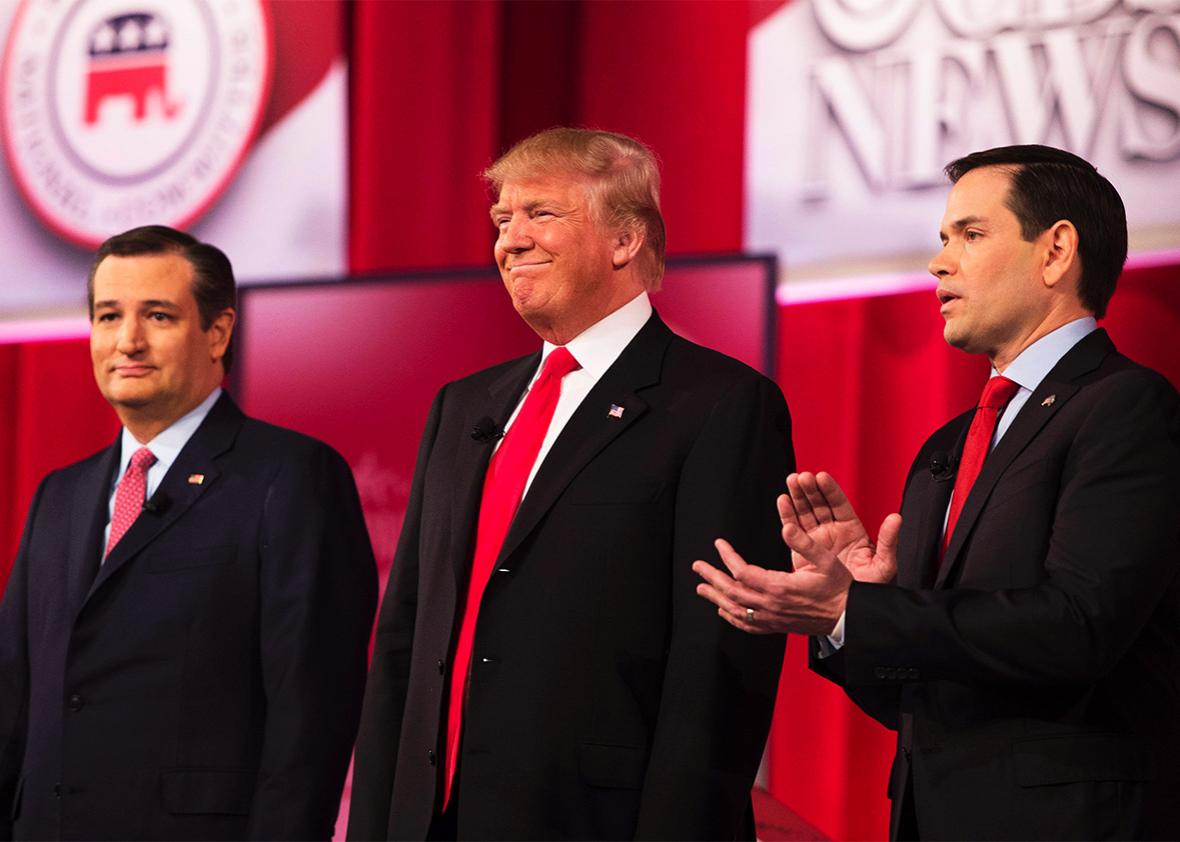With just five days to go until an expected Donald Trump near-sweep on Super Tuesday, Republicans are running out of time to stop the Trump juggernaut. Allow us, though, to indulge a path to the GOP nomination for establishment hero Sen. Marco Rubio that would explain his recent strategy of ignoring Trump. It is the “winnowing” school of nomination victory, and it is rightly falling out of fashion—even with the candidate himself.
The first step would be for Rubio to eliminate Sen. Ted Cruz, who’s having a difficult time expanding his coalition beyond very conservative voters. If Trump beats Cruz in his home state of Texas on Super Tuesday, Cruz would face extraordinary pressure to drop out. This would explain why Rubio—until Wednesday night, at least—had been focused on hammering Cruz and ignoring Trump.
The second step would be to somehow get Gov. John Kasich, who’s having a difficult time expanding his coalition beyond a very small subset of moderate voters, to come to his senses and drop out of the race before his home state of Ohio votes on March 15. Rubio, then, would have to start accumulating delegates en masse in the winner-take-all contests beginning that Tuesday, starting with his home state of Florida. He would subsequently have to rely on the friendlier back-end of the nominating calendar to catch up to and ultimately surpass Trump.
As with any theory about how Rubio wins the Republican presidential nomination, there are annoying, real-world complications that immediately come into view.
Cruz may have a narrower appeal than Rubio overall, but he cannot be relied upon to lose Texas. The state’s polling is all over the place right now, with some recent surveys showing Cruz and Trump in a tie and others showing Cruz with a safe lead. Given all of the momentum Trump has after his dominant victories in South Carolina and Nevada, we should expect Texas to be fairly close. But it is still Cruz’s home state. He received the endorsement of Gov. Greg Abbott on Wednesday, and early voting in Texas has been underway since Feb. 16.
Worse for Rubio, Cruz is much more likely to win his home state than the Florida senator is to win his. The first Florida poll in a month came out on Thursday, and it tells the same story that previous polls told: Trump is straight crushing. He leads with 44 percent to Rubio’s 28 and Cruz’s 12. (A top Rubio strategist is instructing us in the media to “chill” over this poll, for what it’s worth, but it hardly seems unfair to believe that Trump is maintaining the strong lead he’s always had in Florida.) Even in the highly unlikely scenario that both Cruz and Kasich were out of the race on March 15, Trump would likely peel off enough of their support to maintain his margin above Rubio. And either with or without Kasich in the race, Rubio doesn’t appear to have much of a shot at Ohio.
In other words, Rubio cannot rely on the calendar to save him. Cruz would use any Texas victory as a justification to stay in the race indefinitely, even if voting thus far has shown that he struggles to expand, or even maintain, his base of support. Rubio would likely still stay in the race even if he lost Florida, now that he’s the party-backed horse. Kasich may not be long for this race, but it doesn’t really matter. If the field never winnows to a two-person race, the party never reaches the point where anti-Trump voters can coalesce behind a single alternative candidate—or at least not until it’s too late. After March 15—when Cruz’s, Rubio’s, and Kasich’s home states of Texas, Florida, and Ohio will have all finally voted—more than half of bound delegates will have been awarded, a large proportion of them to Donald Trump. And even if Rubio did win Florida: Congratulations, he will have won his home state. Then what?
The situation is far too late and dire for the usual cutesy overthinking about lanes and winnowing to be the first priority of those who back the remaining non-Trump candidates. There is no viable strategy to the nomination that circumvents Trump; the candidates will have to go through him. It is counterproductive for Cruz and Rubio to mostly bombard each other when neither has much reason to drop out because they’re losing equally. The goal of all sides has to be to bring Trump’s numbers down. If Trump is blitzing his way to the nomination, any strategy that includes ignoring him indefinitely as a central tactic is not nearly as sophisticated as its designers think it is.
Rubio and his people have apparently taken a hint. Wednesday night—shock of shocks—the candidate who is losing badly to Trump introduced some criticisms of Trump. This sets up a clash between Rubio and Trump in Thursday night’s debate, which will allow us to see if Rubio melts in head-to-head conflict the way he did with Chris Christie. Rubio had to incur Trump’s wrath at some point. If there’s a winner in him, he should welcome it.
Read more Slate coverage of the GOP primary.
